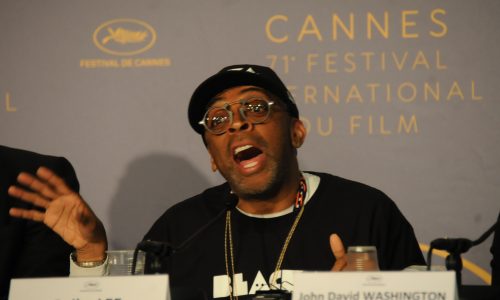
Press conferences often help you understand the message that a film-maker is trying to convey, if their film was a little too subtle, for example. This morning, Spike Lee had a chance to clarify to journalists exactly the message he’d tried to get across at the end of BLACKkKLANSMAN. “We have a guy in the White House – I’m not even going to say his f*cking name – that mother-f*cker didn’t denounce the Klan, the Alt Right and the Nazi mother-f*ckers.” He opened his press conference by explaining why he had to use footage from last year’s Charlottesville protests as a coda for his film – much of it sent in by protestors who’d filmed it on their phones. Although the story on which his film was based, he wanted to end it in the present day to highlight the failure to resolve the race problem in his country – and although racism never went away during the Obama years, Lee points the finger of blame directly at Mr Obama’s successor. “We look to our leaders for moral decisions. This right wing bullshit is all over the world. We have to wake up. We can’t be silent.” After a pause, he apologised. “The shit that’s going on makes me want to curse.”
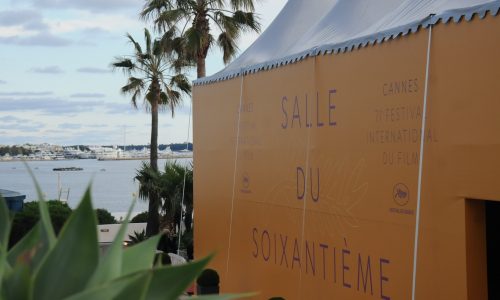
I slipped out of Spike Lee’s press conference a little early, because I wanted to catch a film that was sure to elicit even more controversy. Lars Von Trier’s The House That Jack Built marks the Danish director’s return to Cannes after being banned in 2011 for saying that he could understand where Hitler was coming from when he decided to kill millions of Jews. In the event, the screening was full, so I missed out. In true Cannes style, there were reports of around a hundred people walking out midway through – although not much can be gleaned from this, given that it’s perfectly possible this was not because they were offended by the brutality and misogyny but because they had a meeting to get to. The only thing that is certain is that with so many people leaving, there probably would’ve been a seat for me to jump into pretty quickly, if they’d allowed me to stand at the back.
The failure to get into this film gave me a gap in my schedule, so – in such circumstances, it’s often worth popping to the UK Film Centre, just to see who happens to be around that I know. Sitting in the corner of the beach terrace, contemplating his 2018 Cannes journey was Scottish writer and director Michael Newland, who last year had been having trouble raising financing for his film Stef & Zef. He told me that something I’d said to him last year might have helped him get the ball rolling; in his earlier draft of the script, his main character was Albanian trying to escape local gangsters but during our discussion last year, I’d suggested that it might be easier to fund the film – keeping the same dynamic – if the main character was Ukrainian, trying to get away from pro-Russian rebels. After initially dismissing my idea, he eventually decided to give it a go and as a result, has now found half of the money he needs.
On my way back out of the UK Film Centre came another fortuitous encounter that would not have occurred had I got in to see Mr Von Trier. There, standing at the reception, was British producer Nick Hirschkorn – someone I’ve known since primary school – and who, despite living and working five minutes walk from each other, I only ever get around to meet up with in Cannes. That had been looking unlikely on this occasion, because of our busy schedules but as luck would have it, we managed to squeeze in a fifteen minute catch-up as we walked up the Croisette to his next meeting. So far, most of the people I’d been talking to had been meeting small sales agents in the Riviera exhibition centre, but Hirschkorn plays with the big boys, who hire apartments overlooking the beach and hang huge banners over their terraces. Since I last spoke to him, he’s got a new, younger cast in place for the main feature project he’s putting together, having decided to lower the age of the protagonists. He said he’d been making good progress in Cannes and with his key cast in place, was trying to work out which country would provide the best financial incentives to shoot the film in.
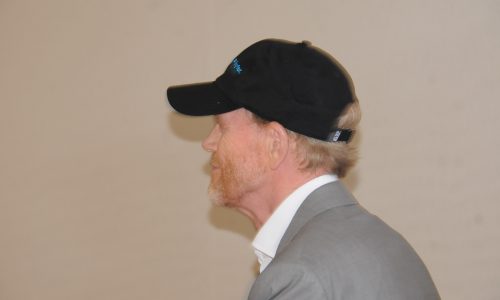
Next I popped up to the press room to do a bit of work, while outside Ron Howard and his team were doing an informal chat with Cannes Film Festival’s TV channel. As I was typing away, a German journalist shouted that Ron Howard was coming across the bridge outside. A group of us dashed to the doorway to get a photograph. One of the most modest and personable people in Hollywood, Howard slowed down, smiled and waved as he walked past. Annoyingly, my camera was playing up and refused to focus – until he’d started to walk off again. I missed the wave, but at least I got a nice photograph of his left ear. Burnt by this, I headed back to the apartment to change into my suit for a busy evening ahead.
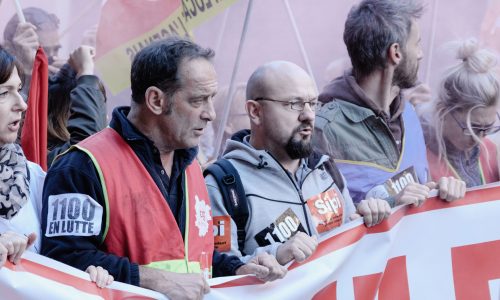
Part one of this busy evening was a screening of another festival film, a gritty and humourless social drama At War by French director Stéphane Brizé and with a towering central performance from Vincent Lindon, someone who’s becoming almost as much of a fixture here as the festival’s director Thierry Frémaux. Last year, he played the sculptor Rodin in an eponymous biopic and two years earlier, he starred as a man struggling to put his life back together after losing his job in The Measure of a Man. His role in At War takes him back to the world of industrial turmoil – and then some. As a union rep at a German-owned manufacturing plant in southern France, he leads a strike – that drags on for weeks, paralysing his colleagues almost as much as it paralyses their bosses – to try to get the owners to reverse their plans to shut the factory with the loss of 1100 jobs. Called At War, the film shows how a range of battles – against their local bosses, the foreign owners, the chambers of commerce and politicians among others – are fought in the course of a wider war for jobs. Brizé takes an unusual approach to what is at risk of being a dry and worthy film, but by immersing the camera, often at shoulder level, among the strikers, the audience is right in the middle of the action and while it clearly sympathises with the workers, it does highlight perhaps the most difficult battle – the war of the strikers against their own comrades who would rather take a pay-off to go quietly. Another directorial flourish is an arguably incongruous score that works to ratchet up the tension almost as the music does in such films as Run Lola Run. But at the centre of this film is a powerhouse turn from Lindon who steals the scene as much when he is preaching as he does when he stands quietly at the back of the room listening to others and waiting for the moment to pounce.
There were three more things on the list for tonight, and there was a big clash on the horizon. One of the hottest tickets of the whole festival was always going to be Solo: A Star Wars Story – but with the festival’s screening schedule published only at the last minute, Creative Scotland could not have imagined that it would be shown for the exact two hour period during which they would be promoting Scotland as a shooting venue. I had to go to this reception as these are people I know and like and want to support, not just faceless foreign film commissions whose invitations some more fickle journalists might often accept only until something better comes along. But with this taking place a brisk ten minute walk up the beach, it would be very touch and go as to whether it would be possible to show my face and still make it to Solo. With the new regime of the press seeing it after, rather than before the official premier, there would be two screenings to choose from – one in the 1000 seater Debussy cinema, 15 minutes after the premier started and one in the much smaller Bazin, starting another 15 minutes later still. I’d have more chance of getting into the bigger one, but that would give me 15 minutes less at the Scotland reception. There was the option of a much later screening – but that would then clash again with the Solo party and that was an invite I simply couldn’t ignore – for many people, that would be the highlight of the whole festival experience.
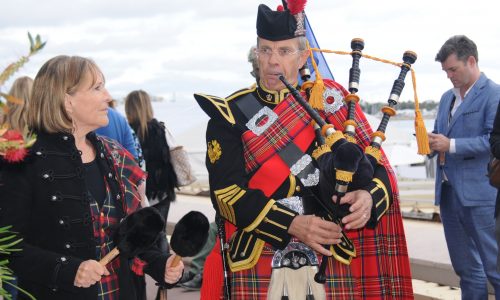
So I headed up to the Creative Scotland party and hovered outside, listening to the bagpipes while they were still setting up inside, before heading down to the beach as the metaphorical doors swung open. I’ve never been the first to turn up to anything. On arrival, we were given wrist-bands to allow re-entry, which would be a useful back-up if I didn’t get into Solo, I thought. As I entered the reception, I apologised for my potential early departure so the head of Creative Scotland’s press team was quick to launch into all the good news that she had to share with me. And there was plenty of good news – not least that this financial year, Creative Scotland has managed to secure a budget of double the £10 million pounds it spent on film and high-end TV production in Scotland in the last financial year – and this additional money would also come with additional staff. So after featuring in none other than Avengers Infinity War of late, you can expect t see a lot more film-making activity in Scotland over the coming year – and all being well years.
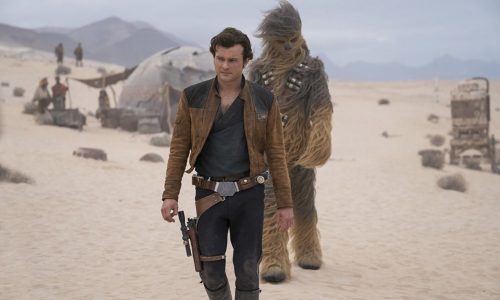
After just twenty minutes at the Scotland reception, I made my excuses and left – I’d need to travel through hyperspace to get to the Solo screening early enough to get in. I surprised myself by arriving in good time – and getting in and even had a respectable seat. The film – in truth – was much as expected. Plenty of fun, just the right number of references to earlier films in the wider universe and largely feeling consistent with the Han Solo we know from the original trilogy – even if Paul Bettany’s villain did little more than scowl a lot, some important characters had unconvincing arcs, the plot was at times basic and often a little incoherent and I always have a bit of trouble when we’re asked to root for this guy who is, in effect, little more than a thief. Alden Ehrenreich isn’t quite sure whether to imitate Harrison Ford or to make the character his own and ends up doing a bit of both, although he doesn’t quite have the comic timing of his predecessor. In truth, it’s another one of these critic-proof films that will blow up box office records despite being a silly story – because silly as it is, it’s competent, action-packed and tremendously good – and largely good-natured – fun.
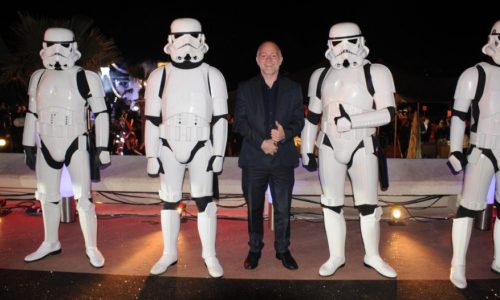
With justice having been restored to the universe – or something – it was time to celebrate that fact at arguably the biggest Hollywood party I’ve ever seen at Cannes. The whole of the Croisette was closed off for security – of which there were several levels – first taking your ticket, then checking names off lists, then the typical airport security routine. Once inside, the first of the gimmicks was a line of imperial storm troopers, posing for photographs with guests. Once further down into the party, there was more food and drink than you can imagine there could be in the whole universe – with chefs preparing it as you watched and waiters bring other platters around, while the pier housed a couple of dessert bars, dripping with hot chocolate to drizzle onto waffles and pancakes, in additional to a huge variety of dessert snacks. The stars had their own area cordoned off, but the set-up meant that I was helping myself to some spinach and ricotta pasta (before I’d found the fish table), Donald Glover – the young version of The Empire Strikes Back’s Lando Calrissian – was helping himself to nibbles from the other side of the same table.
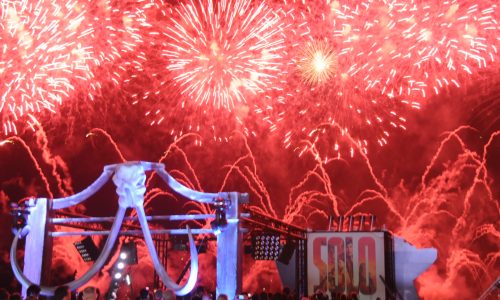
Once the food was out of the way – or at least, on pause – there was so much more to do: a photo-booth to have your picture taken with Han Solo’s gun, a mock-up of the cock-pit of the Millennium Falcon to have your photo taken in, a full-size statue of Chewbacca, a virtual reality tour of a key scene in the film – all topped off with an eight minute long firework display, launched from a little way out to sea.
On the way back to the apartment, typical Cannes style, I stopped to find a friend at one party, before being introduced to everyone there and then being dragged off to meet more people in another party. And the “two minute goodbye” was closer to two hours. No wonder Cannes is so tiring – not that I would expect any sympathy from anyone.
